所有比较级锦囊
英语语法之-比较级和最高级精华

形容词副词的比较级和最高级一、变化规则(一)规则形容词、副词的比较级和最高级1.一般单音节词:—er,—est.2.以—e结尾的词,—r,—st, 例: later, latest.3.重读闭音节且词尾是单个辅音字母,双写该辅音字母,再加—er,—est. 例: bigger, biggest.(hot、fat、thin)4.辅音字母+y结尾,变y→i,加—er,—est.例:happy—happier—happiest (healthy early busy)5.多数双音节、三音节的词,前面加more构成比较级,加most构成最高级.例:more useful , most useful. (注:形容词+ly构成的副词,加more, most构成比较级和最高级.)例:slowly—more slowly—most slowly (二)、常见不规则的形容词副词比较级和最高级.(注:farther表示实际的距离,further表示抽象的“更进一步” older比较年龄,elder用于兄弟姐妹之间的长幼关系)二、形容词原级、比较级、最高级的用法(一)、原级比较常用的句型1.…as+原级+as….(肯定形式,和…一样…)例:It’s as cold as it was yesterday.2.…not as/so +原级+as….(否定形式)例:Things are not as/so good as before.3.…as + 形容词 +a(an)+名词+as….例:She’s as old a woman as my grandma.4.…as + 原级 +名词+as….例:He has as much money as I.(二)、比较级常用的句型(比较级必须是同类事物)1…比较级+than+比较对象(强调前者)例:My drawing is nicer than yours.2…the+比较级+of+比较范围(表示和…一样不…)例:This book is the better of the two.3.the+比较级…,the+比较级…。
初中英语形容词和副词的比较级和最高级大全(各版本通用)
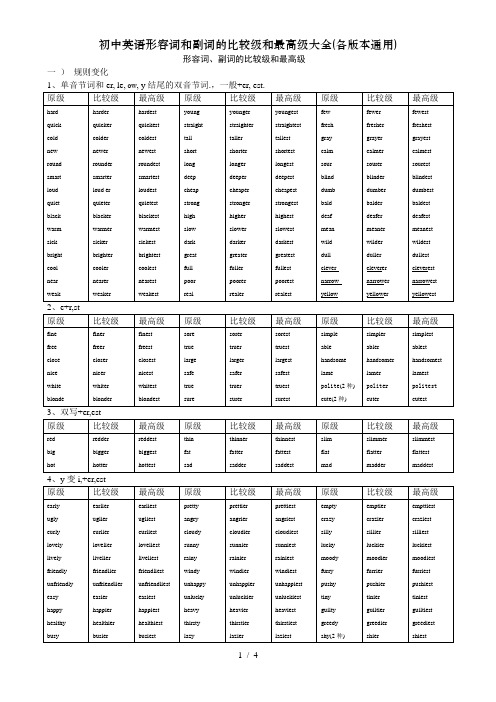
furrier
pushier
tinier
guiltier
greedier
shier
empttiest
craziest
silliest
luckiest
moodiest
furriest
pushiest
tiniest
guiltiest
greediest
shiest
5、多音节词和部分双音节词,还有ly结尾的副词,在词前+more, most。(斜体词不考)
unfriendly
easy
happy
healthy
busy
funny
scary
earlier
ugllivelier
friendlier
unfriendlier
easier
happier
healthier
busier
funnier
scarier
earliest
ugliest
warmest
sickest
brightest
coolest
nearest
weakest
young
straight
tall
short
long
deep
cheap
strong
high
slow
dark
great
full
poor
real
younger
straighter
taller
shorter
longer
quicker
colder
newer
rounder
smarter
louder
英语比较级用法汇总

英文比较级用法一、加后缀-er和-est构成单音节和部分双音节形容词加后缀–er和–est构成比较级和最高级。
如:原级比较级最高级tall taller tallestnarrow narrower narrowestquiet quieter quietest【注意】(1) 若原级以字母e结尾,则只加-r和-st。
如:fine—finer—finest。
(2) 若原级以“辅音字母+y”结尾,则应将y改为i改为,再加-er和-est构成比较级和最高级。
如:dry—drier—driest。
(例外。
如:shy—shyer—若原级为重读闭音节结尾,且末尾只有一个辅音字母,则双写这个辅音字母后再加词尾-er和-est构成比较级和最高级。
如:big —bigger—biggest。
二、在其前加more和most构成多音节和部分双音节形容词在其前加more和most构成比较级和最高级。
如:原级比较级最高级difficult more difficult most difficultdangerous more dangerous most dangerous【注意】(1) 有的双音节形容词(如clever, common, gentle, handsome, happy, narrow, polite, quiet, shallow, sii-font-family: 'Times Nimple, stupid)可以有两种方式构成比较级和最高级。
如:clever —cleverer / more clever —cleverest / most clever 等。
某些带有否定前缀un-的三音节形容词(如uncommon, unhappy, unpleasant, untidy等)可以用两种比较等级形式。
如:unhappy—unhappier / more unhappy —unhappiest / most unhappy。
初中英语高频形容词比较级最高级变化整合表
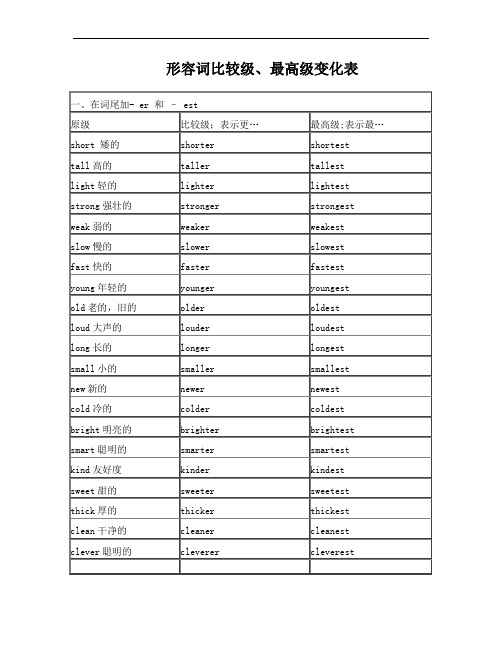
形容词比较级、最高级变化表二、形容词原级、比较级和最高级句型(特殊)原级句型:1“甲+be+(倍数)+as+形容词原级+as+乙”表示“甲和乙程度相同”或“甲是乙的几倍Tom is as old as Kate.汤姆和凯特年龄一样大。
2甲+实意动词+(倍数)+as+副词原级+as+乙”表示“甲和乙程度相同”或“甲是乙的几倍”Tom runs twice as fast as Mike.汤姆跑得速度是迈克的二倍。
3“甲+be+not+as/so+形容词原级+as+乙”甲不如乙…This room is not as/so big as that one.这个房间不如那个大。
4甲+助动词+not+动词原形+as/so+副词原级+as+乙”甲不如乙He doesn’t walk as slowly as you.他走路不像你那样慢。
比较级句型:1.修饰比较级的词有:……多了:a lot, much, far. 甚至更…… even, still, 稍微有点……a little, a bit但是many 不能修饰比较级。
(many more 修饰复数名词除外----many more books)e.g: far more better, a little earlier,Our city is much more beautiful than yours.Do you feel any better now?2.表示“大三岁”,“高二厘米”时要用“表示数、量的词+比较级”来表示。
I'm two years older than you.我比你大二岁。
3.“比较级+ than any other +单数名词”表示“比其他的任何……都……”(这个句型是用比较级形式表达最高级的意思。
)He is better than any other student in the class.他在班里,比任何一个别的学生都好。
比较级的用法总结
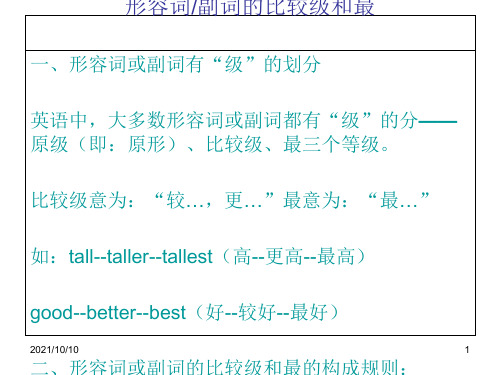
quickly--more quickly--most quickly
slowly--more slowly--most slowly
quietly--more quietly--most quietly
5.由“辅音字母+元音字母+辅音字母”构成的单音节 形容词或副词,先双写末尾的辅音字母,然后再加-er
2021/10/10
10
3.英语中,表示“越来越……”,常用“比较级 +and+比较级”结构表达。 【即:同一个比较级用and连接叠加
在一起】
如果是多音节的形容词或副词,则用“more and more +多音节形容词或副词原级”。
bigger and bigger 越来越大 smaller and smaller
如:He is five years younger than me.他比我小(年轻)5岁。
I am two years older than my brother. 我比我的弟弟大(老)两岁。
This ruler is three meters longer than that one. 这把尺子比那一把长3米。
/ -est .
【当然只是少数几个】
如:big--bigger--biggest hot--hotter--hottest
thin--thinner--thinnest sad--sadder--saddest
6.所有多音节或部分双音节形容词或副词的比较级和
最高级,并非在词尾加-er/-est,而是在原级前放more
(7) far--farther--farthest 【指实际距离的远】
(7) far--further--furthest 【指抽象意义上的远】
初中英语比较级知识点总结
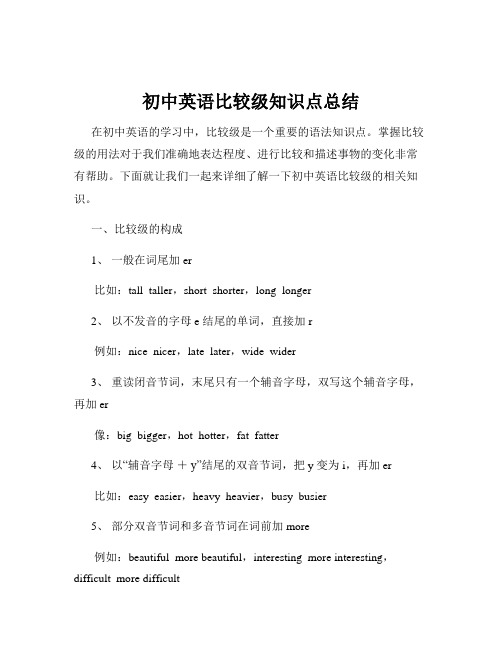
初中英语比较级知识点总结在初中英语的学习中,比较级是一个重要的语法知识点。
掌握比较级的用法对于我们准确地表达程度、进行比较和描述事物的变化非常有帮助。
下面就让我们一起来详细了解一下初中英语比较级的相关知识。
一、比较级的构成1、一般在词尾加 er比如:tall taller,short shorter,long longer2、以不发音的字母 e 结尾的单词,直接加 r例如:nice nicer,late later,wide wider3、重读闭音节词,末尾只有一个辅音字母,双写这个辅音字母,再加 er像:big bigger,hot hotter,fat fatter4、以“辅音字母+y”结尾的双音节词,把 y 变为 i,再加 er比如:easy easier,heavy heavier,busy busier5、部分双音节词和多音节词在词前加 more例如:beautiful more beautiful,interesting more interesting,difficult more difficult6、不规则变化good/well betterbad/ill worsemany/much morelittle lessfar farther/further二、比较级的用法1、表示两者之间的比较A + be +比较级+ than + B例如:He is taller than me(他比我高。
)A +实义动词+比较级+ than + B比如:She runs faster than him(她跑得比他快。
)2、比较级+ and +比较级,表示“越来越……”例如:It's getting colder and colder(天气变得越来越冷。
)He is becoming more and more beautiful(她变得越来越漂亮。
)3、 the +比较级,the +比较级,表示“越……,越……”比如:The more you read, the more you know(你读得越多,知道得就越多。
所有比较级单词大全
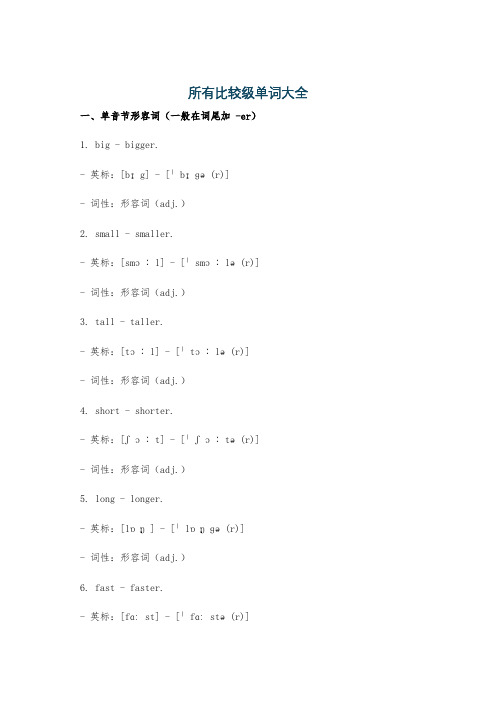
所有比较级单词大全一、单音节形容词(一般在词尾加 -er)1. big - bigger.- 英标:[bɪg] - [ˈbɪɡə(r)]- 词性:形容词(adj.)2. small - smaller.- 英标:[smɔːl] - [ˈsmɔːlə(r)]- 词性:形容词(adj.)3. tall - taller.- 英标:[tɔːl] - [ˈtɔːlə(r)]- 词性:形容词(adj.)4. short - shorter.- 英标:[ʃɔːt] - [ˈʃɔːtə(r)]- 词性:形容词(adj.)5. long - longer.- 英标:[lɒŋ] - [ˈlɒŋɡə(r)]- 词性:形容词(adj.)6. fast - faster.- 英标:[fɑːst] - [ˈfɑːstə(r)]- 词性:形容词(adj.)/副词(adv.)7. slow - slower.- 英标:[sləʊ] - [ˈsləʊə(r)]- 词性:形容词(adj.)/副词(adv.)8. strong - stronger.- 英标:[strɒŋ] - [ˈstrɒŋɡə(r)]- 词性:形容词(adj.)9. weak - weaker.- 英标:[wiːk] - [ˈwiːkə(r)]- 词性:形容词(adj.)10. young - younger.- 英标:[jʌŋ] - [ˈjʌŋɡə(r)]- 词性:形容词(adj.)11. old - older.- 英标:[əʊld] - [ˈəʊldə(r)]- 词性:形容词(adj.)二、以 -e 结尾的单音节形容词,直接加 -r。
1. nice - nicer.- 英标:[naɪs] - [ˈnaɪsə(r)]- 词性:形容词(adj.)2. large - larger.- 英标:[lɑːdʒ] - [ˈlɑːdʒə(r)]- 词性:形容词(adj.)三、重读闭音节,且末尾只有一个辅音字母的形容词,双写这个辅音字母,再加-er。
小学英语形容词比较级最高级重点讲解及练习
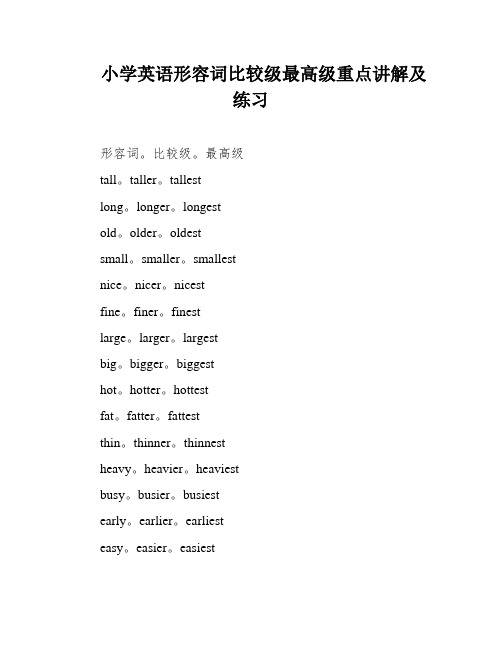
小学英语形容词比较级最高级重点讲解及练习形容词。
比较级。
最高级tall。
taller。
tallestlong。
longer。
longestold。
older。
oldestsmall。
smaller。
smallestnice。
nicer。
nicestfine。
finer。
finestlarge。
larger。
largestbig。
bigger。
biggesthot。
hotter。
hottestfat。
fatter。
fattestthin。
thinner。
thinnestheavy。
heavier。
heaviestbusy。
busier。
busiestearly。
earlier。
earliesteasy。
easier。
easiest单音以字母e结尾的形容词或副词,直接加-r,-st。
少数双音节以重读闭音节结尾的形容词或副词,如末尾只有一个辅音单字母,双写该字母,再加-er,-est。
以“辅音字母+y”结尾的形容词或副词,把y变为i,再加-er,-est。
部分双音节与多音节的词比较级在原级之前加more,最高级在原级之前加most,例如:beautiful---more beautiful---most beautifulinteresting---more interesting---most interestingdifficult---more difficult---most difficult不规则变化的形容词:little/few(原形)-less(比较级)-least(最高级)good(原形)-better(比较级)-best(最高级)bad(原形)- worse(比较级)- worst(最高级)far(原形)-- further—furthest例句:Tom is tall。
but John is taller。
Bob is the tallest of the three.I'm as tall as you.Tom is as tall as John.Bob is taller than John.John is the tallest in his class.1.Nice: The weather is nice today。
(完整版)英语单词比较级
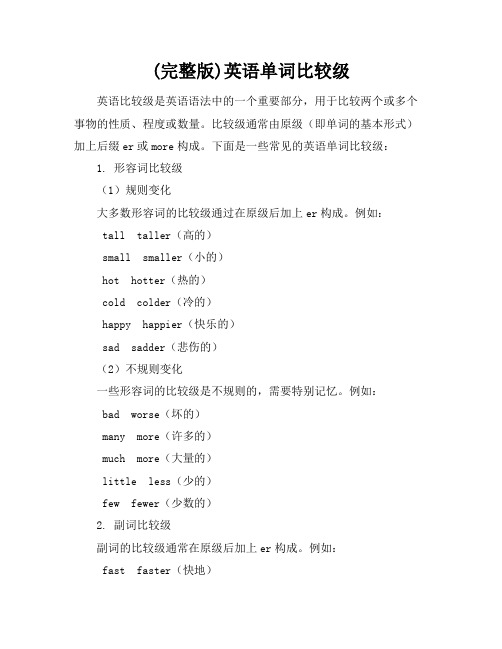
(完整版)英语单词比较级英语比较级是英语语法中的一个重要部分,用于比较两个或多个事物的性质、程度或数量。
比较级通常由原级(即单词的基本形式)加上后缀er或more构成。
下面是一些常见的英语单词比较级:1. 形容词比较级(1)规则变化大多数形容词的比较级通过在原级后加上er构成。
例如:tall taller(高的)small smaller(小的)hot hotter(热的)cold colder(冷的)happy happier(快乐的)sad sadder(悲伤的)(2)不规则变化一些形容词的比较级是不规则的,需要特别记忆。
例如:bad worse(坏的)many more(许多的)much more(大量的)little less(少的)few fewer(少数的)2. 副词比较级副词的比较级通常在原级后加上er构成。
例如:fast faster(快地)slowly more slowly(慢地)carefully more carefully(仔细地)well better(好地)badly worse(坏地)3. 比较级的用法(1)形容词和副词的比较级通常与than连用,构成比较句。
例如:He is taller than me.(他比我高。
)She runs faster than him.(她比他跑得快。
)(2)在比较级前可以使用一些修饰词,如a little, much, far 等,表示比较的程度。
例如:This book is a little more interesting than that one.(这本书比那本更有趣。
)She sings much better than her sister.(她唱歌比她姐姐唱得好多了。
)She is the tallest girl in our class.(她是我们班最高的女孩。
)He runs the fastest in our school.(他是我们学校跑得最快的。
中考初中英语--形容词比较级最高级(整理版)

中考初中英语--形容词比较级最高级(整理版)单音节词和少数双音节词,加词尾-er, -est来构成较级和最高级。
其Array他双音节词和多音节词,在前面加more,most来构成比较级和最高级。
1. 不规则变化形容词比较级最高级练习题一、写出下列形容词的比较级和最高级1. old ______ ________2. busy _________ _________3. thin ________ ________4. many _________ _________5. slow ________ _____6. delicious _________ ______二、用适当形式填空:1. Bob is ________( young ) than Fred but__________(tall) than Fred.2. He is ______ (bad) at learning maths. He is much _______ (bad) at Chinese and he is the _________(bad) at English.3. Annie says Sally is the ________ (kind) person in the world.4 A dictionary is much _________ (expensive) than a story-book.5. An orange ia a little ______ (big) than an apple, but much ________ (small) than a watermelon.6. Playing computer games is______ _____ _____ of all the activities.(interesting).7. The Nile(尼羅河) is ______ ________river in the world. (long)8. Good health is _______ _______ ________thing life. (important)9. Taking a taxi is ______ _______ way to get to the airport. (easy)10. She is_______ than all the other students. (young)11. Where is the ________bus-stop? (near)12. Tom drives much ________ ________than John. (careful)13. The white flower is ________(beautiful). The yellow flower is ______ _______ (beautiful)than the white flower. The red flower is the _____ ______ of the three.三、选择题1. She is ________ than ________ .A. busier / usB. busier / weC. more busy / usD. more busy / we2. China is ________ country in the world.A. the third largestB. the largest thirdC. the third largeD. a third largest3. -Which is ____ season in Beijing?-I think it's autumn.A.goodB.betterC.bestD.the best4.- Which is__________ , the sun, the moon or the earth?-- Of course, the moon is.A.smallB.smallerC.smallestD.the smallest5.The air in Beijing is getting much _____ now than a few years ago.A. cleanB. cleanerC. cleanestD. the cleanest6. Mobile phones are very popular now and they are _____ than before.A. cheapB. cheaperC. cheapestD. the cheapest7 Which is _____ , a bicycle or a computer?A. expensiveB.more expensiveC.the most expensive8. The Yellow River is one of ______rivers in China A long B longer C the longest9.She is the second _______student in our class. A. tall B. taller C. tallest一、英语阅读理解专项练习试卷1.根据短文内容,判断句子正误。
不规则比较级总结50个

不规则比较级总结50个不规则比较级是英语中常见的一种形式,它是指在比较级形式中,形容词或副词的变化规则不符合一般规则的情况。
在学习英语的过程中,了解和掌握不规则比较级是非常重要的,因为它们在日常生活和各种语境中都会频繁出现。
下面我们来总结一下50个常见的不规则比较级,希望对大家的学习有所帮助。
1. good(好)better(更好)。
2. bad(坏)worse(更坏)。
3. little(小)less(更小)。
4. much(多)more(更多)。
5. many(多)more(更多)。
6. far(远)farther/further(更远)。
7. late(晚)later(更晚)。
8. old(老)older/elder(更老)。
9. old(旧)older(更旧)。
10. far(远)further(更远)。
11. old(老)oldest/eldest(最老)。
12. old(旧)oldest(最旧)。
13. far(远)farthest/furthest(最远)。
14. late(晚)latest(最晚)。
15. bad(坏)worst(最坏)。
17. much(多)most(最多)。
18. many(多)most(最多)。
19. good(好)best(最好)。
20. well(好)better(更好)。
21. badly(坏)worse(更坏)。
22. little(少)less(更少)。
23. much(多)more(更多)。
24. many(多)more(更多)。
25. far(远)farther/further(更远)。
26. late(晚)later(更晚)。
27. old(老)older/elder(更老)。
28. old(旧)older(更旧)。
29. far(远)further(更远)。
30. old(老)oldest/eldest(最老)。
31. old(旧)oldest(最旧)。
比较级变化口诀
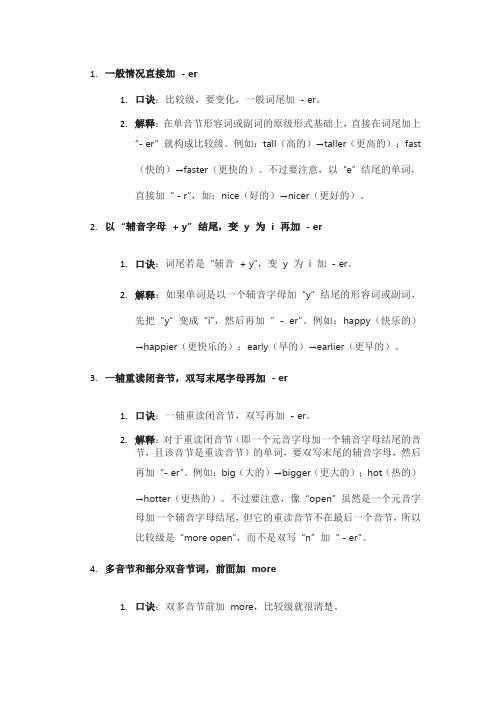
1.一般情况直接加- er1.口诀:比较级,要变化,一般词尾加- er。
2.解释:在单音节形容词或副词的原级形式基础上,直接在词尾加上“- er” 就构成比较级。
例如:tall(高的)→taller(更高的);fast(快的)→faster(更快的)。
不过要注意,以“e” 结尾的单词,直接加“ - r”,如:nice(好的)→nicer(更好的)。
2.以“辅音字母+ y” 结尾,变y 为i 再加- er1.口诀:词尾若是“辅音+ y”,变y 为i 加- er。
2.解释:如果单词是以一个辅音字母加“y” 结尾的形容词或副词,先把“y” 变成“i”,然后再加“ - er”。
例如:happy(快乐的)→happier(更快乐的);early(早的)→earlier(更早的)。
3.一辅重读闭音节,双写末尾字母再加- er1.口诀:一辅重读闭音节,双写再加- er。
2.解释:对于重读闭音节(即一个元音字母加一个辅音字母结尾的音节,且该音节是重读音节)的单词,要双写末尾的辅音字母,然后再加“- er”。
例如:big(大的)→bigger(更大的);hot(热的)→hotte r(更热的)。
不过要注意,像“open” 虽然是一个元音字母加一个辅音字母结尾,但它的重读音节不在最后一个音节,所以比较级是“more open”,而不是双写“n” 加“ - er”。
4.多音节和部分双音节词,前面加more1.口诀:双多音节前加more,比较级就很清楚。
2.解释:多音节形容词(三个或三个以上音节)和部分双音节形容词,它们的比较级是在原级前面加上“more”。
例如:beautiful(美丽的)→more beautiful(更美丽的);careful(仔细的)→more carefu l(更仔细的)。
判断双音节词是加“ - er” 还是“more”,有些小窍门,比如以“ - ful”“ - less”“ - ing”“ - ed” 等结尾的双音节词,一般加“more”,不过也有一些特殊情况需要记忆。
比较级

英语语法---比较级和最高级一、形容词、副词的比较级和最高级的构成规则1.一般单音节词和少数以-er,-ow结尾的双音节词,比较级在后面加-er,最高级在后面加-est;(1)单音节词如:small→smaller→smallest short→shorter→shortest tall→taller→tallest great→greater→greatest (2)双音节词如:clever→cleverer→cleverest narrow →narrower→narrowest2.以不发音e结尾的单音节词,比较在原级后加-r,最高级在原级后加-st;如:large →larger→largest nice→nicer→nicest able→abler→ablest3.在重读闭音节(即:辅音+元音+辅音)中,先双写末尾的辅音字母,比较级加-er,最高级加-est;如:big→bigger→biggest hot→hotter→hottest fat→fatter→fattest 4.以“辅音字母+y”结尾的双音节词,把y改为i,比较级加-er,最高级加-est;如:easy→easier→easiest heavy→heavier→heaviest busy→busier→busiest happy→happier→happiest5.其他双音节词和多音节词,比较级在前面加more,最高级在前面加most;如:beautiful →more beautiful→most beautiful different→more different→most different easily→more easily→most easily4 8. 比较级与最高级的转换:Mike is the most intelligent in his class. Mike is more intelligent than any other student in his class 7.修饰比较级和最高级的词1)可修饰比较级的词①.a bit, a little, rather, much, far, by far, many, a lot, lots, a great deal, any, still, even等。
小学英语形容词比较级顺口溜
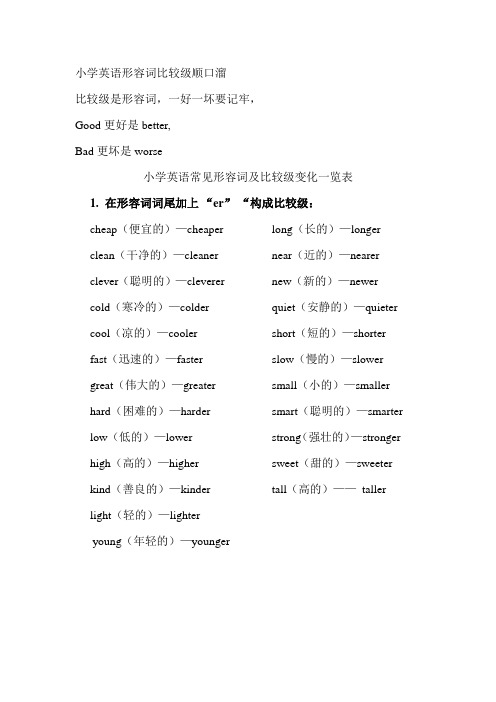
小学英语形容词比较级顺口溜比较级是形容词,一好一坏要记牢,Good更好是better,Bad更坏是worse小学英语常见形容词及比较级变化一览表1.在形容词词尾加上“er”“构成比较级:cheap(便宜的)—cheaper clean(干净的)—cleaner clever(聪明的)—cleverer cold(寒冷的)—colder cool(凉的)—cooler fast(迅速的)—faster great(伟大的)—greater hard(困难的)—harder low(低的)—lowerhigh(高的)—higher kind(善良的)—kinder light(轻的)—lighter long(长的)—longernear(近的)—nearer new(新的)—newerquiet(安静的)—quieter short(短的)—shorter slow(慢的)—slower small(小的)—smaller smart(聪明的)—smarter strong(强壮的)—stronger sweet(甜的)—sweetertall(高的)——talleryoung(年轻的)—younger2.双写最后一个字母,再加上“er”构成比较级:big(大的)—bigger fat(胖的)—fatterhot(热的)—hotter sad(伤心的)—sadder thin(瘦的)—thinner3.以不发音的字母e结尾的形容词,加上“r”构成比较级:close(接近的)—closer fine(好的)—finerlarge(巨大的)—larger late(迟的)—laternice(好的)—nicerwhite(白的)—whiter3.以字母y结尾的形容词,把y改为i,再加上“er”构成比较级:busy(忙碌的)—busier early(早的)—earlier easy(容易的)—easier friendly(友好的)—friendlier pretty(美丽的)—prettier funny(好玩的)—funnier happy(开心的)—happier healthy(健康的)—healthier heavy(重的)—heavier hungry(饿的)—hungrier lazy(懒惰的)—lazier lucky(幸运的)—luckier4.noisy(嘈杂的)—noisier 不规则变化的形容词:bad(坏的)—worse good(好的)—better far(远的)—farther ill(病的)—worse little(少的)—lessmany(多的)—more much well(好的)—betterold(年老的)—older5.在单词前面加上“more”构成比较级:afraid(害怕的)—more afraidbeautiful(美丽的)—more beautifuldelicious(美味的)—more deliciousexciting(令人兴奋的)—more excitingexpensive(昂贵的)—more expensivehard-working(勤奋的)—more hard-workinghelpful(有帮助的)—more helpfulinteresting(有趣的)—more interestingpolite(有礼貌的)—more politetired(累的)—more tired询问某人的身高:How tall +be动词+主语例如:How tall is your brother?(你的弟弟有多高?)He is 1.7 metres. (他有1.7米) 1.7(one point seven)询问某人的体重:How heavy +be动词+主语例如:How heavy is he?(你有多重?)He is 49 kilograms.(他有49公斤)A is taller thanB (A比B高.)(than前面的更)询问某人穿多大的鞋子:例如:What size are your shoes?(你穿多大的鞋子?) Size 7.(七号)Than 前面加er (比较级)有than 一定有比较;比较是两者之间进行的。
初中英语形容词和副词的比较级和最高级大全(各版本通用)
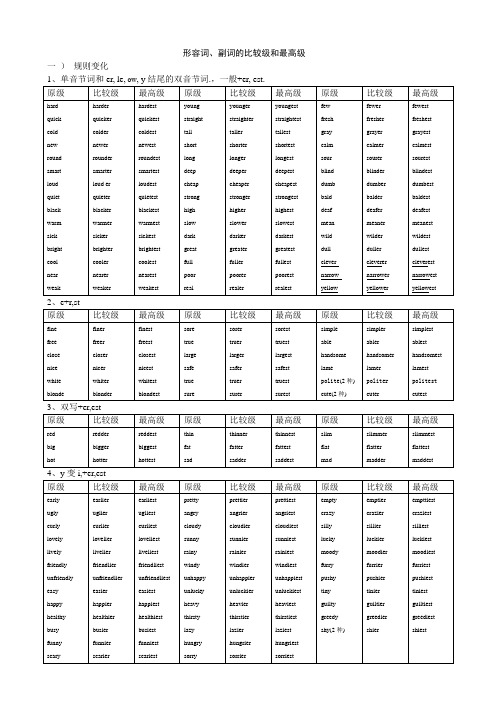
more completely
more quickly
more quietly
more carefully
more beautifully
more comfortably
more useful
more famous
more beautiful
more creative
more serious
most talented
most pleased
most crowded
most disappointed
most famous
most expensive
most inexpensive
most honest
most wonderful
most interesting
most fantastic
lazy
hungry
sorry
prettier
angrier
cloudier
sunnier
rainier
windier
unhappier
unluckier
heavier
thirstier
lazier
hungrier
sorrier
prettiest
angriest
cloudiest
sunniest
rainiest
beautiful
creative
serious
outgoing
amazing
awful
exciting
excited
interested
talented
pleased
crowded
disappointed
比较级归类总结

1.单音词的变化:比较级直接在词尾+ er;最高级直接在词尾+est。
2.以不发音e结尾的单音节词,比较级直接加r;最高级直接加st。
3.在重读闭音节(即:辅音+元音+辅音)中,要双写结尾的辅音字母,然后比较级加—--er;最高级加—--est。
4.辅音字母加y结尾的单音节词和双音节词(有ly后缀的词除外)要将“y”改为“i”后,比较级加-—-er;最高级加—--est。
6.不规则变化1、原级(同级)比较:as…as…;not as(so)…as…We’ll give you as much help as we can。
She isn't as(so)active in sports as before.2. 比较级:表示两者之间比…… 更……可用状语much, a little, even等修饰:He made fewer mistakes than I did。
He is even richer than I.3、高级:形容词最高级前必须加the,副词最高级前常省略the,后面多用of……, in……短语表示范围:It was the most/least interesting story I have ever listened。
He is the tallest of the three。
4、如果在两者之间表示“最……”时要在比较级前加the,而且还用of the two,of the pair短语:John is the clever of the two boys.Of the two boys, John is the clever.三、重点与难点:1、as…as…结构:你和汤姆是一样好的孩子。
You’re a boy as good as Tom。
=You’re as good a boy as Tom。
2、(1)too…to与so…that sb.can’t…的句型转换:前者为简单句,主语只有一个,而后者为复合句,主语有两个,试比较:The man was too angry to be able to speak.The man was so angry that he wasn't able to speak.The milk was too hot to drink。
- 1、下载文档前请自行甄别文档内容的完整性,平台不提供额外的编辑、内容补充、找答案等附加服务。
- 2、"仅部分预览"的文档,不可在线预览部分如存在完整性等问题,可反馈申请退款(可完整预览的文档不适用该条件!)。
- 3、如文档侵犯您的权益,请联系客服反馈,我们会尽快为您处理(人工客服工作时间:9:00-18:30)。
所有比较级锦囊cheap——cheapertall——tallershort——shortersmall——smallerold——oldercold——coldercool——coolernew——newerlong——longerstrong——stronger warm——warmerfast——fasterquiet——quieterdark——darkerbright——brighterclean——cleaneryoung——youngerweak——weakerthick——thickerquick——quickereasy →easier→easiestlazy→lazier →laziestpretty →prettier→prettiestnaughty →naughtier→naughtiestmealy→mealier →mealiestearly →earlier →earliestthirsty→thirstier →thirstiestDull →duller →dullestLoud→louder→loudestBoring→more boring→most boring Creative→more creative→most creative Warm→warmer→warmestExpensive→more expensive→most expensivehigh →higher →highestlarge→larger→largestwet →wetter→wettestbusy→busier→busiestdelicious →more delicious→most deliciousheavy→heavier→heaviestdry→drier→driest不规则形容词比较等级的形式变化good-better-best 好的well-better-best 身体好的bad-worse-worst 坏的ill-worse-worst 病的many-more-most 许多much-more-most 许多few-less-least 少数几个little-less-least 少数一点儿(little-littler-littlest 小的)far-further-furthest 远(指更进一步,深度。
亦可指更远)far-farther-farthest 远(指更远,路程)old-older-oldest 年老的(指年纪)old-elder-eldest 年老的(指兄弟姐妹的排行)过去式/过去分词A. 原形与过去式和过去分词完全相同.cost----cost----cost cut----cut----cut put----put----putlet----let----let set----set----set hit----hit----hitshut----shut----shut hurt---hurt----hurt read---read----read 读音/e/lie---lied---lied 说谎lay---laid---laid 放置,下蛋lay--- lain 躺下,位于,平放eg. The hens don’t _______eggs during such cold weather.She _____ her books on the table. ____B. 过去式与过去分词完全相同1. 过去式和过去分词中含有ought, aught, 读音是〔:t〕bright----brought----brought think----thought----thought buy----bought----bought catch----caught----caught teach ---- taught ----taught2. 动词原形中的e为o,变成过去式和过去分词。
get----got----got sell----sold----sold tell----told----told3. 动词原形中i为a,sit----sat----sat spit----spat----spat4. 动词原形中i为o,win----won----won shine----shone/ shined----shone / shined5. 动词原形中an为oo,stand----stood---stood understand----understood----understood6. 动词原形中的ay为ai,say----said----said pay----paid----paid7. a)动词原形中的d为t,send----sent----sent lend----lent----lentspend----spent----spent build----built----builtb ) 动词原形最后一个字母改为t ,smell----smelt----smelt lose----lost----lostc ) 动词原形后加一个字母t,learn----learnt----learnt mean----meant----meant 读音/e/d ) 动词原形中的ee去掉一个字母e, 然后在词尾加t. 字母e发音/e/ feel----felt----felt sleep----slept----slept sweep---swept----sweptkeep---- kept----- kept其它meet----met----met have----had----had hold----held----heldmake----made----made dig----dug----dug hear----heard----heardfind----found----found hang----hung ----hungC.原型与过去分词相同come----came----come run----ran----run become----became----becomeD. 原形,过去式,和过去分词完全不同1. 把动词原形中i改为a变成过去式,改成u变成过去分词.begin ---- began -----begun drink---drank----drunk ring----rang-----rung swim----swam----swum sing----sang----sung2. 把动词原形中o改为e变成过去式,在原形词尾加n变成过去分词.blow----blew----blown grow----grew----grown know---knew---known throw ---- threw ---- thrown fly ----flew /flu:/ ----flown ( 和以上相似)3. 以下动词的过去分词都以en结尾,故把它们分为一类.a ) 把动词原形中i改为o变成过去式,在词尾加n变成过去分词.drive----drove----driven rise---rose---risen write---wrote---written (双写t )ride----rode----ridden (双写d )b ) 把动词原形中ea改为o, 在词尾加e变成过去式,在过去式后加n变成过去分词.speak----spoke----spoken steal----stole----stolen break----broke----brokenc ) 把动词原形中的个别字母或字母组合改为o变成过去式, 在过去式后加n变成过去分词.wake----woke----woken freeze----froze----frozenchoose----chose----chosen forget----forgot----forgotten (双写t,加en )d) 其它过去分词以en结尾的动词eat----ate----eaten beat---- beat ---- beaten fall----fell----fallengive----gave----given see----saw----seen take----took----takenmistake---- mistook----- mistaken hide----hid----hidden (双写d )E. 没有过去分词的动词can ----- could -may---- might -shall---- should-will ---- would -其它am, is ---- was----- been are-----were----- been do-----did----- donedraw-----drew----- drawn/:/go-----went----- gone show----showed----shownwear--- wore ---- worn1. 把动词原形中的o改为a,变成过去式。
过去分词不变.become—became, come—came2.把动词原形中的i改为a,变成过去式。
:begin—began,drink—drank,give—gave,ring—rang,sing—sang,sit—sat,swim—swam ,sink—sank,3.把重读开音节中的i改为o,变成过去式。
drive—drove,ride—rode,shine—shone,win—won,write—wrote4.动词原形中的e改为o,变成过去式。
get—got,forget—forgot5.动词原形中的eep改为ept,变成过去式。
keep—kept,sleep—slept,sweep—swept6. 动词原形中的an改为oo,变成过去式。
stand—stood,understand—understood7.改动词原形中的aw /ow为ew,变成过去式。
draw—drew,grow—grew,know—knew,throw—threw(动词show除外,show—showed)8.动词原形中的eak改为oke,变成过去式。
:break—broke,speak—spoke9.动词原形中的ell改为old,变成过去式。
sell—sold,tell—told10.以ought和aught结尾,且读音是〔:t〕的过去式。
bring—brought,buy—bought,think—thought,catch—caught,teach—taught11.以ould结尾且读音为〔ud〕的情态动词过去式。
